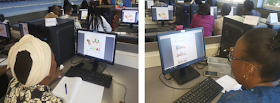Computational thinking is a set of problem-solving methods that involve expressing problems and their solutions in ways that a computer could execute. The ability to break down a problem, recognize patterns, think in abstract ways, and create algorithms to find solutions are valuable thinking skills for computer science, information technology, mathematics and science learners.

 There is no cost to enter the Talent Search competition - however please register your learners here. Registration is important to ensure that top performing learners receive certificates and to enable the Computer Olympiad to keep accurate records of how many learners have completed the challenge.
There is no cost to enter the Talent Search competition - however please register your learners here. Registration is important to ensure that top performing learners receive certificates and to enable the Computer Olympiad to keep accurate records of how many learners have completed the challenge.
At a number of 2018 YouthSpark workshops, we challenged teachers to complete some of the Computer Olympiad Computational Thinking challenges. The teachers agreed that the resources were challenging, but also fun and accessible. We would now like to encourage more teachers to build their learners computational thinking skills by taking part in the Computer Olympiad Talent Search - which will also provide an opportunity for learners who already have great thinking skills to be identified and celebrated.
Teachers should select a time that suits them between Monday 4 March to Friday 8 March 2019 to complete this year's Talent Search question paper. Learners should be given 45 minutes to complete the test. Of course, the practice tests are available all year long and can be attempted at any time to build the computational skills of learners.
Do you need internet access and computers to participate in the Talent Search?
The Talent Search is available as an online test for those schools with adequate facilities. For schools lacking facilities, it is available as a pen-and-paper test. If your school is doing the pen and paper version of the test, you will need to arrange for a class set of question papers and one multiple choice question answer sheet to be printed per learner in advance of the test.
Who is the Talent Search aimed at?
There are two age categories for primary schools and three age categories for high schools (Gr 4 & 5; 6 & 7; 8 & 9; 10 & 11; 12). Grade 4 and 5 learners can complete the challenge as individuals or in pairs, whilst older learners compete as individuals. A school can enter just a few learners or many learners as a teacher wishes to sign up. So, a teacher may want to get all learners in a grade to try out a past paper, and then to select the strongest candidates to represent the school in the 2019 Talent Search. The Talent Search is the South African version of the Bebras Contest which attracts more than two million participants globally each year. The Computer Olympiad team aim to attract over 7 000 entries from no-fee schools in the 2019 Talent Search competition.
How should learners prepare for the Talent Search?
Past Talent Search question papers are available on the Computer Olympiad website. Print out some past pen and paper trials or challenge learners to complete a past online paper. These question papers will give them an idea of what to expect, especially if you go through the answers with your learners so they can see a range of strategies that they can use to approach similar puzzles. Younger learners, who are unfamiliar with multiple choice questions, or learners who have not completed an online test before, will benefit from a practice run where a teacher can assist if required.
At their discretion, teachers may want to let learners tackle a past paper in pairs or groups of three so that learners can "think aloud" and discuss strategies for solving the puzzles. Teachers may also want to consider getting everyone to complete a past paper as a practice exercise and then inviting the top performing learners to enter this year's Talent Search.
What other competitions are there?
The Applications Olympiad is a challenge for those who take CAT or the ICDL or are otherwise computer literate. The participants have to solve a number of problems using applications like spreadsheets, databases and a wordprocessor and the data provided.
The Programming Olympiad is a challenge for learners who can use a programming language like Scratch, Python, Java, C++ or Delphi. In the First Round, the participants have to solve a number of problems using the language of their choice. For the Second and Final Rounds, the languages are more restricted. Check out the Computer Olympiad website for more details and dates.
There is no requirement that Talent Search participants should enter either Olympiad, nor is there a requirement to do the Talent Search before entering either of the Olympiads.
How do I register?
 There is no cost to enter the Talent Search competition - however please register your learners here. Registration is important to ensure that top performing learners receive certificates and to enable the Computer Olympiad to keep accurate records of how many learners have completed the challenge.
There is no cost to enter the Talent Search competition - however please register your learners here. Registration is important to ensure that top performing learners receive certificates and to enable the Computer Olympiad to keep accurate records of how many learners have completed the challenge.
Please check out the FAQ section of the Computer Olympiad website, or contact them directly should you have further questions.
Please make an effort to stretch and challenge your learners and then share your success stories with us.
Please make an effort to stretch and challenge your learners and then share your success stories with us.




No comments:
Post a Comment